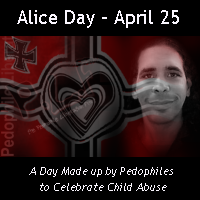It is always horrifying when an adult, a figure of authority, violates a child's trust.
We should all be prepared if this should happen to our own children. What will you do if your child's trust is violated?
April is Child Abuse Awareness Month throughout the United States.The National Center for Missing and Exploited Children provides simple instructions for us to deal with any revelations that a child who is close to us has been a victim of sexual molestation and exploitation.
Approach this situation in a calm, straightforward manner, so as not to alarm or frighten the child. Do not panic or overreact to the information disclosed by the child. With your support, you will both make it through these difficult times.
Do not criticize the child. The worst thing you can do is to express anger at the child having violated previous instructions. Outbursts such as "I told you not to go into anyone's home" will only hinder your ability to help.
Be sure to respect the child's privacy. Accompany the child to a private place where he can relate his story. Be careful not to discuss the incidents in front of people who do not need to know what happened.
Make sure the child knows this revelation was the right thing to do and that you will protect the child from future harm.
Remember, often a child molester or exploiter will tell the child that bad things will happen if the child ever tells anyone what has happened.
The child is especially fearful of punishment, panic, or the loss of a parent's love. Make a special effort to show physical affection and express your love and confidence with words and gestures.
Avoid challenges starting with why, such as "Why didn't you tell me this before?" or "Why did you let this happen?"
Give positive messages, such as "I'm proud of you for telling me this," "I'm glad it wasn't worse" or "It is not your fault."
Explain to the child that he has done no wrong, since he might have feelings of guilt and responsibility and assume that he is to blame for what happened. Most children are enticed or tricked into acts of exploitation. Children think they should have been smarter or stronger.
Children seldom lie about acts of sexual exploitation. It is important that the child feels that you believe what he has told you.
Keep the lines of communication with the child open. In the future, it will be vitally important that the child believe that you are sympathetic, understanding, supportive, and optimistic.
By your doing so, he will be comfortable in making additional disclosures as well as discussing his feelings, which is an important step in the healing process.
Subscribe to:
Post Comments (Atom)






No comments:
Post a Comment